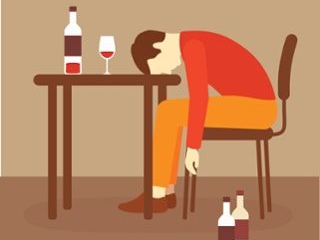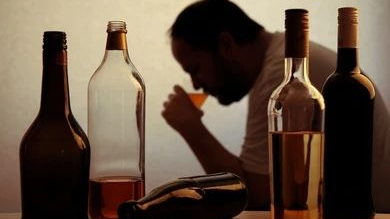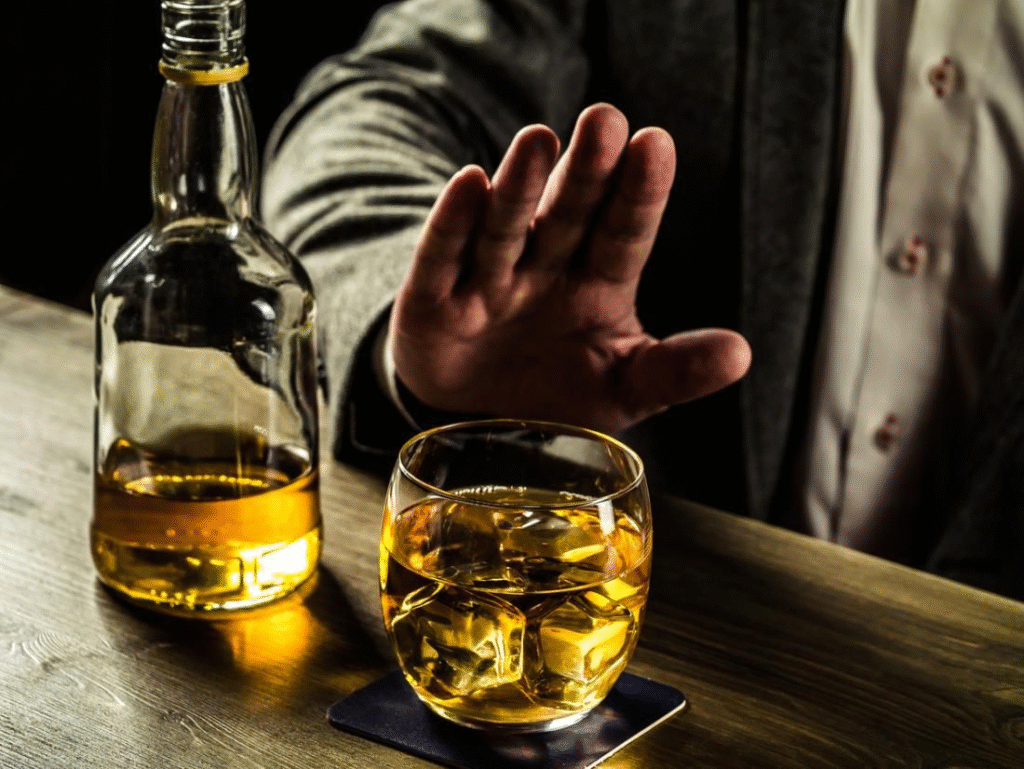
Hey folks! Everyone feels sad or lonely sometimes. It’s a normal part of life. When people feel down, they try different things to cheer up—like talking to a friend, watching a movie, or going for a walk. But some people turn to alcohol, thinking it will help them feel better. Does drinking really make sadness go away? Or does it actually make things worse?
In this guide, we are going to talk about alcohol and depression. We will see how alcohol affects our mood and mental health. Some believe that drinking can help them relax and forget their worries, but is that really true? Can alcohol actually help with depression, or does it cause even more problems? Let’s find out! By the end of this article, you will understand whether alcohol is a good or bad choice for people who feel sad or depressed.
What is Depression?
Depression is a serious health problem that affects how a person feels, thinks, and acts. It makes people feel very sad, tired, and hopeless for a long time. This is not the same as feeling sad for a day or two. Depression lasts for weeks, months, or even years. It can make life feel very difficult.
People with depression may lose interest in things they once loved, like hobbies, spending time with friends, or even eating their favorite food. They may have trouble sleeping, feel exhausted all the time, or find it hard to get out of bed in the morning. Some people may also feel worthless or think that nothing will ever get better.
Symptoms of depression can include:
- Feeling sad or empty most of the time
- Losing interest in activities you once enjoyed
- Changes in appetite or weight
- Trouble sleeping or sleeping too much
- Feeling tired or lacking energy
- Feeling worthless or guilty
- Difficulty concentrating or making decisions
- Thoughts of death or suicide
Depression can be caused by a combination of genetic, biological, environmental, and psychological factors. It is important to seek help from a mental health professional if you or someone you know is experiencing symptoms of depression.
Why Do Some People Drink Alcohol When They Are Depressed?

When people feel sad or upset, they often look for ways to feel better. Some watch movies, listen to music, or talk to a friend. But others may turn to alcohol, thinking it will help them forget their problems. At first, alcohol might make them feel relaxed, happy, or less worried. This is because alcohol changes the way the brain works for a short time.
However, alcohol does not really fix sadness or depression. The happy feeling does not last long, and once it wears off, people may feel even worse than before. Over time, drinking too much alcohol can make depression worse. It can also lead to other problems, like trouble sleeping, mood swings, and even more sadness.
Some people may start drinking often to cope with their feelings, but this can turn into a dangerous habit. Instead of helping, alcohol can make life harder. So, is drinking a good way to handle depression? Let’s find out!
Alcohol’s Impact on Depression
Drinking alcohol affects the brain and changes the way a person thinks and feels. At first, alcohol may make someone feel happy, relaxed, and less worried. This is why some people drink when they feel sad. However, these good feelings do not last. After some time, alcohol can make a person feel even worse than before. It can increase sadness, tiredness, and anxiety. Here are some ways alcohol affects depression:
1. Alcohol is a Depressant and Slows the Brain
Alcohol is a depressant, which means it slows down brain activity. This can make a person feel even more tired, sad, and unmotivated. If someone already has depression, drinking alcohol can make their symptoms worse. They may feel more hopeless, lonely, or unenergetic after drinking. Instead of making them feel better, alcohol can increase negative thoughts and emotions.
2. Alcohol Disrupts Sleep and Rest
Many people with depression already struggle with sleep problems. Drinking alcohol can make it even harder to get a good night’s sleep. It may help someone fall asleep faster, but it can cause them to wake up often during the night. Poor sleep can make a person feel more tired, moody, and sad the next day. Over time, lack of sleep can make depression even worse.
3. Alcohol Lowers Serotonin, the “Happy Chemical”
Serotonin is a special chemical in the brain that helps control mood and emotions. When serotonin levels are low, a person can feel sad, worried, or hopeless. Alcohol reduces the amount of serotonin in the brain, which can make depression worse. This means that even if drinking makes someone feel happy for a short time, they may feel much worse later.
4. Alcohol Can Increase Anxiety and Worry
Some people drink alcohol to relax and forget their problems. However, when the effects of alcohol wear off, they may feel even more anxious than before. Anxiety and depression often go together, and drinking alcohol can make both conditions worse. Instead of feeling calm, a person may feel nervous, restless, or overwhelmed after drinking.
5. Alcohol Affects Thinking and Decision-Making
Alcohol can make it hard for people to think clearly and make good choices. It slows down the brain, making it difficult to control emotions and actions. Some people may say or do things they regret, which can lead to guilt and sadness. Bad decisions caused by alcohol can increase stress, loneliness, and depression.
While alcohol may seem like an easy way to escape sadness, it actually makes depression worse in the long run. Instead of helping, it creates more problems that can make life even harder.
How Alcohol Affects the Brain?

Alcohol affects the brain by changing the levels of certain chemicals, including serotonin and dopamine. These chemicals are important for regulating mood, and when their levels are disrupted, it can lead to feelings of depression. Alcohol can also interfere with the brain’s ability to process emotions, making it harder to cope with stress and negative feelings.
Short-Term Effects of Alcohol on Depression
In the short term, alcohol may provide temporary relief from feelings of sadness or anxiety. This is because alcohol can have a calming effect on the brain, making you feel more relaxed and less worried. However, this effect is only temporary. As the alcohol wears off, you may feel even worse than before. This is because alcohol can disrupt the balance of chemicals in the brain, leading to increased feelings of depression and anxiety.
Long-Term Effects of Alcohol on Depression
Over time, drinking alcohol regularly can have serious negative effects on your mental health. Chronic alcohol use can lead to changes in the brain that make depression worse. It can also lead to other mental health problems, such as anxiety and mood disorders. Additionally, alcohol can interfere with the effectiveness of antidepressant medications, making it harder to treat depression.
Depression Caused by Alcohol
In some cases, alcohol can actually cause depression. This is known as alcohol-induced depression. When you drink alcohol regularly, it can change the way your brain works, leading to symptoms of depression. Even if you did not have depression before, drinking too much alcohol can increase your risk of developing the condition.
Alcohol and Suicide Risk
One of the most serious risks of using alcohol to cope with depression is the increased risk of suicide. Alcohol can lower your inhibitions and make you more likely to act on impulsive thoughts, including thoughts of self-harm or suicide. Additionally, alcohol can worsen feelings of hopelessness and despair, making it harder to see a way out of your problems.
Alcohol as a Treatment for Depression?

Some people may wonder if alcohol can be used as a treatment for depression. The answer is no. Alcohol is not a safe or effective treatment for depression. While it may provide temporary relief, the long-term effects of alcohol on mental health are negative. Instead of helping, alcohol can make depression worse and lead to other serious health problems.
Healthy Ways to Cope with Depression
If you are struggling with depression, it is important to seek help from a mental health professional. There are many effective treatments for depression, including therapy, medication, and lifestyle changes. Here are some healthy ways to cope with depression:
- Talk to a Therapist: A therapist can help you understand your feelings and develop coping strategies to manage depression.
- Take Medication: Antidepressant medications can help balance the chemicals in your brain and reduce symptoms of depression.
- Exercise Regularly: Physical activity can boost your mood and reduce symptoms of depression.
- Eat a Healthy Diet: Eating a balanced diet can help improve your overall health and well-being.
- Get Enough Sleep: Getting enough rest is important for your mental health.
- Stay Connected: Spending time with friends and family can provide support and help you feel less alone.
- Practice Relaxation Techniques: Techniques like deep breathing, meditation, and yoga can help reduce stress and improve your mood.
The Dangers of Self-Medicating with Alcohol
Self-medicating with alcohol is a dangerous way to cope with depression. While it may provide temporary relief, it can lead to a cycle of dependence and worsen your mental health. Over time, you may find that you need to drink more alcohol to achieve the same effect, which can lead to alcohol addiction. Additionally, alcohol can interfere with your ability to seek and receive proper treatment for depression.
Alcohol Addiction and Depression
Alcohol addiction, also known as alcoholism, is a serious condition that can develop when you drink alcohol regularly over a long period of time. People with alcohol addiction may find it difficult to control their drinking and may continue to drink even when it causes problems in their lives. Alcohol addiction and depression often go hand in hand. People with depression may be more likely to develop alcohol addiction, and people with alcohol addiction are more likely to experience depression.
Treatment for Alcohol Addiction and Depression

If you are struggling with both alcohol addiction and depression, it is important to seek help from a professional. Treatment for alcohol addiction and depression often involves a combination of therapy, medication, and support groups. Here are some common treatments:
- Detoxification: The first step in treating alcohol addiction is detoxification, which involves stopping alcohol use and allowing the body to rid itself of the substance. This process can be difficult and should be done under medical supervision.
- Therapy: Therapy can help you understand the underlying causes of your alcohol addiction and depression. Cognitive-behavioral therapy (CBT) is a common approach that helps you change negative thought patterns and behaviors.
- Medication: Medications can be used to treat both alcohol addiction and depression. Antidepressants can help with depression, while medications like naltrexone and acamprosate can help reduce cravings for alcohol.
- Support Groups: Support groups like Alcoholics Anonymous (AA) can provide a safe space to share your experiences and receive support from others who are going through similar struggles.
Final Thoughts
Depression is a serious condition that requires proper treatment and care. Alcohol may seem like an easy way to cope, but it is not a safe or effective solution. Instead, focus on healthy ways to manage your depression, such as therapy, medication, exercise, and staying connected with loved ones. If you or someone you know is struggling with alcohol addiction and depression, reach out for help. With the right support and treatment, it is possible to overcome these challenges and lead a healthier, happier life.
FAQs (Frequently Asked Questions)
Can drinking alcohol help with depression?
No, drinking alcohol does not help with depression. It may provide short-term relief, but in the long run, it makes depression worse. Alcohol can lower serotonin levels, increase anxiety, and affect sleep, leading to more sadness and emotional struggles.
Can alcohol cause depression?
Yes, alcohol can contribute to depression. Drinking too much alcohol over time can change the way the brain functions, leading to symptoms of depression. This is known as alcohol-induced depression, and it can make existing mental health conditions worse.
What are the short-term effects of alcohol on depression?
In the short term, alcohol may make a person feel relaxed and happy. However, as the effects wear off, it can lead to mood swings, sadness, anxiety, and difficulty thinking clearly. It also disrupts sleep, which can make depression symptoms worse.
Can alcohol make anxiety worse?
Yes, alcohol can make anxiety worse. While it may create temporary relaxation, it often leads to increased anxiety when the effects wear off. Many people experience heightened nervousness, restlessness, or worry after drinking.
Is it safe to drink alcohol while taking antidepressants?
No, drinking alcohol while taking antidepressants is not safe. Alcohol can interfere with how antidepressant medications work, making them less effective. It can also cause dangerous side effects, such as dizziness, drowsiness, and increased risk of overdose.
Where can I get help for alcohol addiction and depression?
You can get help from:
- A doctor or mental health professional
- A licensed therapist or counselor
- Alcohol and drug rehab centers
- Support groups like Alcoholics Anonymous (AA)
- Helplines and crisis support services in your area
What should I do if I have both depression and alcohol addiction?
If you are struggling with both depression and alcohol addiction, it is important to seek professional help. Treatment options include therapy, medication, detox programs, and support groups like Alcoholics Anonymous (AA). A mental health professional can guide you toward the right treatment plan.
Also read: Can Sex Cause UTI (Urinary Tract Infection)?

